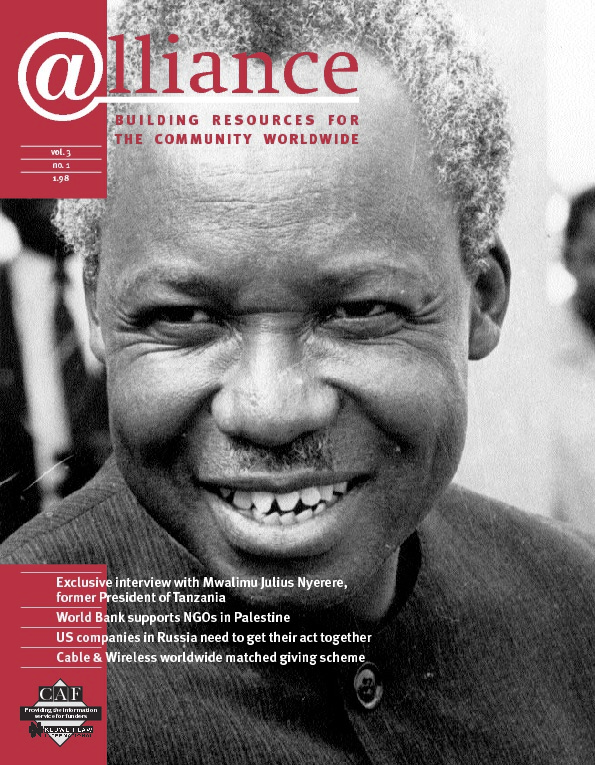US companies are quick enough to reap the business benefits now available in Russia’s emerging free-market economy, but are they contributing to the overall development of society in post-Soviet Russia? A survey carried out by CAF Russia suggests that they are not yet pulling their weight.
Russia, the largest country on earth, covering one-eighth of the world’s land surface, is rich in natural resources, with a growing domestic market and an educated workforce. These factors have all helped bring in significant foreign investment, and US corporations are among those that are benefiting by developing business in Russia’s post-Soviet economy. As corporate philanthropists, however, for the most part US companies have yet to exhibit the same level of commitment to Russian non-profit organizations (NPOs) as shown by their US-based counterparts to US charities.
A study of the philanthropic giving practices of American companies that have operations in Russia was carried out in July 1997 by an intern at the CAF Russia office in Moscow. A questionnaire was sent to 37 Fortune 500 American companies, asking them:
- whether or not they make contributions to NPOs in Russia;
- the form donations take, ie money, gifts in kind, equipment, services;
- whether or not the companies have a corporate giving strategy;
- examples of projects that have received support in the past;
- how charities are identified;
- causes that are excluded, if any;
- the primary disincentives from giving to Russian NPOs.
- Of the 37 companies contacted, ten were interviewed and responded to the survey.
Suspicion on both sides
When asked to generalize about what American corporations are doing in Russia, one public relations person, who wished to remain anonymous, stated simply ‘Not much’. The non-profit sector is in its infancy, and Russian people in general view corporate philanthropy with suspicion. There have been some well-publicized cases of NPO staff taking the money and not actually helping the causes they are meant to support.
The research revealed an attitude of suspicion on the part of many companies. Several stated that corporate giving policies are a confidential matter. This attitude of privacy is virtually unknown in the United States, where corporate philanthropy is used as a public relations tool to make the public aware of a corporation’s goodwill in the communities where it has a corporate presence. All the companies that completed the questionnaire stated that they wished to remain anonymous.
Companies are supporting the non-profit sector . . .
American companies are giving money, equipment, training and volunteer time to various causes. Their areas of interest tend to be health care, children’s issues, arts and culture, and education. Companies do not discriminate between giving to indigenous charities and giving to branches of US charities that are working in Russia. Geographical limitations are pervasive; only one company stated that it gives regardless of whether it has a corporate presence in a community.
One large company stated that it does not give monetary support to Russian NPOs but does encourage employees to volunteer time. It also gives gifts in kind of equipment and furniture to schools. The charities who receive this support are primarily NPOs that have a connection with the lives of the corporation’s employees and their families — schools, hospitals and programmes which support the arts.
An absence of incentives was one reason given by a corporation for not contributing to NPOs in its area. Too many competing needs was another reason for not giving.
. . . but giving strategies are almost totally lacking
With the exception of one company, none of the respondents has a corporate giving policy for Russian NPOs. The majority of the companies look at charitable requests on a case-by-case basis. One large corporation with annual worldwide sales of $8 billion stated that it supports education in Russia but does not have a specific giving policy; nor does it have a budget for charitable gifts to Russian NPOs. This lack of a well-thought-out giving strategy on the part of a company of this size is indicative of its absence of commitment to the non-profit sector in Russia.
One company with a clear policy
One company stood out for its corporate philanthropy. This large corporation has a giving policy governed by its American headquarters; the US office receives suggestions from the Russian office. This company has a significant budget for Russian NPOs through its corporate foundation; it also has employees in Russia who personally scrutinize and investigate NPOs, carrying out site visits and requiring audits of the use of funds received by NPOs. This company was an exception.
Why the non-profit sector matters
The idea of giving back to the areas and communities where employees live and work is just emerging in Russia. The lack of corporate giving policies is at least partially symptomatic of the growing pains that the non-profit sector in Russia is experiencing. There is an information vacuum about the existence of a myriad of legitimate NPOs. Better communication is necessary to enhance the viability of the non-profit sector and create more opportunities for collaboration between corporations and NPOs.
The importance of a healthy non-profit sector in Russia cannot be overestimated. US corporations doing business in Russia have a vested interest in the success and sustainability of the sector. The clear need now is for them to get their act together and carry on the tradition of giving back to the communities in which they operate that they have established in the United States.





Comments (0)